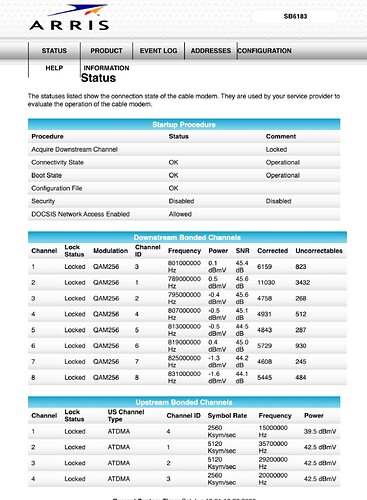Can anyone recommend a decent modem/router? I’m tired of the the one supplied by ISP provider.
First check with your ISP for ones they will allow. Also, are you talking a combo unit?
Yes, combo unit. Had a service guy here today from ISP who replaced defective unit, he said if I were to get a new modem it should be a mesh network unit.
Certain ISP providers will have a list of approved units they will accept.
To expand on @Powerfader point - if it’s not on your ISP’s approved modem list, they can refuse to provision the modem.
Just because you provide your own modem, they still need to have it work with their network. It’s not a plug and play scenario.
Mesh only makes sense if you’re living in a lot of square footage where you can have weak wireless reception in part of your property that is excessively far from your access point.
I’m not fond of combo units. I rather get a dedicated modem (like the reliable line of Arris modems) and a separate wifi router. That gives you the flexibility to upgrade your router in the future as needed and still use the existing provisioned modem. No need to for your ISP to intervene with router upgrades.
If you want, you can add a mesh wireless network to an existing provisioned modem also.
From what you said, I don’t need mesh. I stream all TV via ethernet cable. Wifi in house is ok. My main concern is reception and buffering. Too many instances of up and down signal strength going through cheap supplied modem, and thinking that an upgrade would help. Thanks for response and welcome your input and advice.
If wireless performance in all usable areas in your property is adequate in bandwidth, then having mesh would prove to be limited in raw benefit.
Since your devices are wire fed, then speeds that are affected at those endpoints can be impacted by VPN use or even a compromised ethernet wire or a poorly managed switch.
It’s not necessarily a crap modem that’s to blame. It could be a connection quality issue related to outdoor lines, splices/taps, shorts, etc.
For this to be determined, you should learn how to pull and read your modems signal diagnostic page. Here’s a sample below from an Arris 6183.
In this reference, you should look at SNR levels, power factor, and number ratio of correctable and uncorrectable packets. There are sweet spots in these numbers that would indicate a clean signal from terminal to your house.
Your tech “should” have reviewed these values when he visited.
So if these performance impacts are external, upgrading your modem wouldn’t rectify these issues.
Then don’t worry about wifi. What else do you use wifi for; phone, printer, tablets and laptops. An ethernet connection is the most stable and usually has the strongest connections.
I’ll agree that separate modem and router has more benefits. However, since moving to my new state (Tennessee) I picked up Spectrum and they supplied their own modem and router for free and so far have done a superb job.
I had the Comcast modem/router combo for many years down in Florida and only exchanged the equipment out once. My homes were all on one level and relatively small (<2,000 sq ft).
Fyi, both Comcast and Spectrum have an approved list for hardware.
Check with your service provider for a list of approved combination modum/routers made by Arris and go from there.
